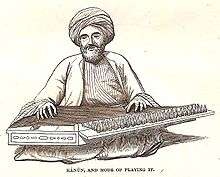qanun
See also: qanûn
English

Man playing a qanun
Etymology
From Turkish kanun, from Arabic قَانُون (qānūn), from Ancient Greek κανών (kanṓn). Doublet of canon.
Noun
qanun (plural qanuns)
Derived terms
Translations
References
- "kanoon." Webster's Third New International Dictionary, Unabridged. Merriam-Webster. 2002.
Azerbaijani
Etymology
From Arabic قَانُون (qānūn), ultimately from Ancient Greek κανών (kanṓn).
Pronunciation
- IPA(key): [ɡɑːnun]
- Hyphenation: qan‧un
Noun
qanun (definite accusative qanunu, plural qanunlar)
- law
- qanun qəbul etmək ― to pass a law
- qanun çıxarmaq ― to make a law
- qanunu pozmaq ― to break the law
- qanunu ləğv etmək ― to abolish the law
- qanun çərçivəsində işləmək ― to operate within the framework of law
- Bir dəfə qanun çıxarmışdılar ki, daha ölmək olmaz, qadağandır. Qanun tez-tez pozulurdu və axırda onu ləğv etdilər.
- Once they made a law that dying isn't allowed anymore, it's prohibited. The law was often violated and at the end they abolished it.
- statute
Declension
Declension of qanun
| singular | plural | |
|---|---|---|
| nominative | qanun | qanunlar |
| definite accusative | qanunu | qanunları |
| dative | qanuna | qanunlara |
| locative | qanunda | qanunlarda |
| ablative | qanundan | qanunlardan |
| definite genitive | qanunun | qanunların |
Possessive forms of qanun
| nominative | ||
|---|---|---|
| singular | plural | |
| mənim (“my”) | qanunum | qanunlarım |
| sənin (“your”) | qanunun | qanunların |
| onun (“his/her/its”) | qanunu | qanunları |
| bizim (“our”) | qanunumuz | qanunlarımız |
| sizin (“your”) | qanununuz | qanunlarınız |
| onların (“their”) | qanunu or qanunları | qanunları |
| accusative | ||
| singular | plural | |
| mənim (“my”) | qanunumu | qanunlarımı |
| sənin (“your”) | qanununu | qanunlarını |
| onun (“his/her/its”) | qanununu | qanunlarını |
| bizim (“our”) | qanunumuzu | qanunlarımızı |
| sizin (“your”) | qanununuzu | qanunlarınızı |
| onların (“their”) | qanununu or qanunlarını | qanunlarını |
| dative | ||
| singular | plural | |
| mənim (“my”) | qanunuma | qanunlarıma |
| sənin (“your”) | qanununa | qanunlarına |
| onun (“his/her/its”) | qanununa | qanunlarına |
| bizim (“our”) | qanunumuza | qanunlarımıza |
| sizin (“your”) | qanununuza | qanunlarınıza |
| onların (“their”) | qanununa or qanunlarına | qanunlarına |
| locative | ||
| singular | plural | |
| mənim (“my”) | qanunumda | qanunlarımda |
| sənin (“your”) | qanununda | qanunlarında |
| onun (“his/her/its”) | qanununda | qanunlarında |
| bizim (“our”) | qanunumuzda | qanunlarımızda |
| sizin (“your”) | qanununuzda | qanunlarınızda |
| onların (“their”) | qanununda or qanunlarında | qanunlarında |
| ablative | ||
| singular | plural | |
| mənim (“my”) | qanunumdan | qanunlarımdan |
| sənin (“your”) | qanunundan | qanunlarından |
| onun (“his/her/its”) | qanunundan | qanunlarından |
| bizim (“our”) | qanunumuzdan | qanunlarımızdan |
| sizin (“your”) | qanununuzdan | qanunlarınızdan |
| onların (“their”) | qanunundan or qanunlarından | qanunlarından |
| genitive | ||
| singular | plural | |
| mənim (“my”) | qanunumun | qanunlarımın |
| sənin (“your”) | qanununun | qanunlarının |
| onun (“his/her/its”) | qanununun | qanunlarının |
| bizim (“our”) | qanunumuzun | qanunlarımızın |
| sizin (“your”) | qanununuzun | qanunlarınızın |
| onların (“their”) | qanununun or qanunlarının | qanunlarının |
Derived terms
- qanuni (“legal”)
- qanuniləşmək (“to legalize”)
- qanuniləşdirmək (“to legalize something”)
- qanuniləşmək (“to legalize”)
- qanunsuz (“illigal”)
- qanunsuzluq (“lawlessness”)
- qanunverici (“legislative; lawmaker”)
- qanunvericilik (“legislation; law-making”)
- qanunverici hakimiyyət (“legislature”)
This article is issued from
Wiktionary.
The text is licensed under Creative
Commons - Attribution - Sharealike.
Additional terms may apply for the media files.